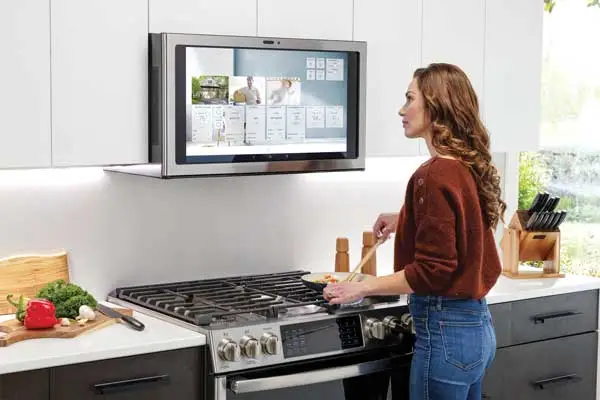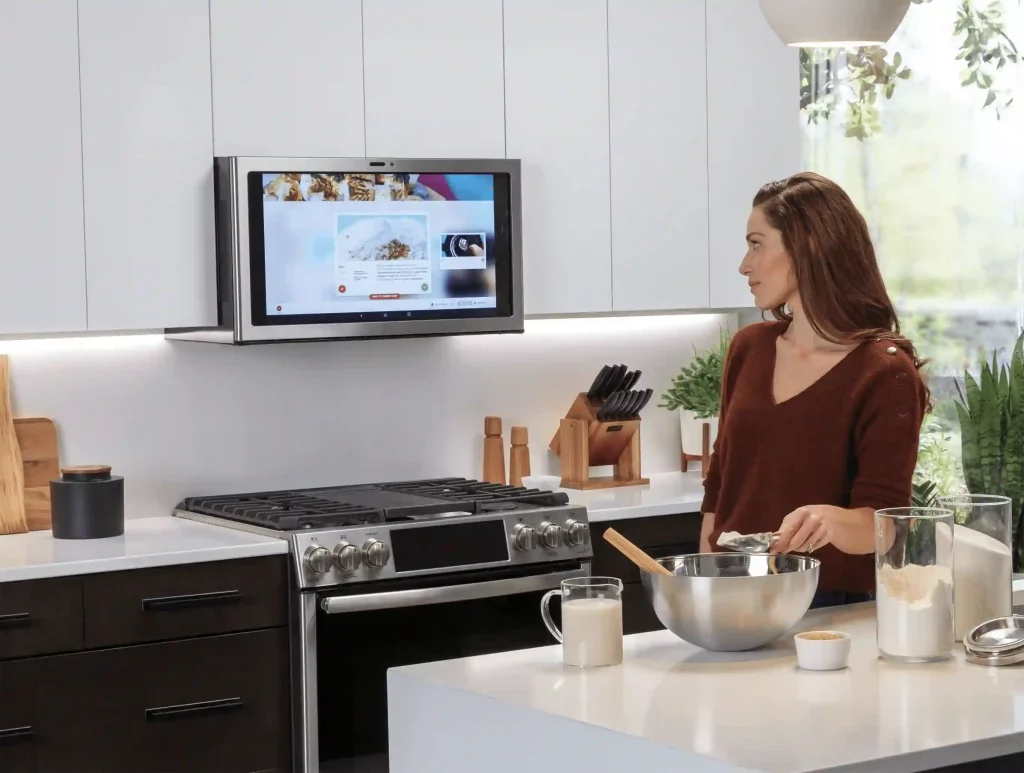In today’s fast-paced world, efficiency and convenience hold great importance. Smart kitchen technologies have emerged as a game-changer for modern homes. These innovations revolutionize the way we interact with our kitchens, seamlessly blending automation, connectivity, and artificial intelligence.
By integrating smart appliances with features like voice control and mobile apps, homeowners can experience a new level of convenience and productivity. Managing grocery lists, meal planning, optimizing energy consumption, and reducing waste become effortless.
In this article, we explore the key benefits of these technologies and how they enhance the overall efficiency and lifestyle of your home.
Key Takeaways
- Smart kitchen technologies revolutionize the way we prepare and cook meals, offering convenience and efficiency in everyday lives.
- These technologies streamline the cooking process, save valuable time and energy, and enable remote monitoring and control of appliances.
- Modern kitchen technologies contribute to a healthier lifestyle with features like calorie tracking and personalized meal planning.
- They also improve energy efficiency, reduce waste, enhance convenience, save time, increase safety, optimize food storage, and improve cooking precision.
The Importance of Smart Kitchen Technologies
Smart kitchen technologies have become increasingly important in modern homes. With advancements in technology, these innovative kitchen tools and appliances have revolutionized the way we prepare and cook our meals.
From smart refrigerators that can create shopping lists and track expiration dates to voice-controlled assistants that can provide recipes and cooking instructions, these technologies offer convenience and efficiency in our everyday lives.
By incorporating modern kitchen technologies into our homes, we can streamline our cooking process and save valuable time and energy. These technologies can help us monitor and control our appliances remotely, allowing us to preheat ovens, adjust cooking temperatures, and even receive notifications when our meals are ready. With the ability to connect to our smartphones and other devices, modern kitchen technologies enable us to stay connected and in control of our kitchen activities.
Furthermore, modern kitchen technologies can also contribute to a healthier lifestyle. Many of these technologies offer features such as calorie tracking, nutritional information, and personalized meal planning, which can assist us in making informed food choices and maintaining a balanced diet. By providing us with real-time data and insights, these technologies empower us to take charge of our health and well-being.
How Smart Kitchen Technologies Enhance Efficiency
Smart kitchen technologies significantly enhance efficiency in the home by streamlining the cooking process and providing convenient features that save time and energy.
These technologies include smart appliances, such as refrigerators, ovens, and dishwashers, that can be controlled remotely and programmed to perform specific tasks. For example, a smart oven can be preheated remotely, saving time and allowing the user to start cooking immediately upon arrival.
Smart refrigerators can monitor food inventory and expiration dates, helping users to plan meals and reduce waste.
Additionally, modern kitchen technologies often include voice-activated assistants, such as Amazon Alexa or Google Assistant, which can provide recipe suggestions, set timers, and answer questions, further streamlining the cooking process.

Streamlining Daily Tasks With Smart Kitchen Technologies
Streamlining daily tasks in the kitchen is made effortless with the integration of modern kitchen technologies. These technologies are designed to enhance the efficiency and convenience of everyday kitchen activities. Here are four ways modern kitchen technologies can help streamline daily tasks:
- Automated appliances: Smart appliances such as refrigerators, ovens, and dishwashers can be controlled remotely through smartphone apps. This allows users to preheat the oven, start the dishwasher, or adjust the temperature of the refrigerator from anywhere, saving time and effort.
- Voice-controlled assistants: Virtual assistants like Amazon Alexa or Google Assistant can be integrated into the kitchen, providing hands-free control over various tasks. Users can ask for recipes, set timers, create shopping lists, and even order groceries without lifting a finger.
- Smart storage solutions: Intelligent storage systems can help organize kitchen items more efficiently. These systems use sensors and RFID technology to keep track of inventory and notify users when supplies are running low. This ensures that necessary ingredients are always available and reduces the time spent searching for items.
- Meal planning and recipe apps: Smart kitchen technologies offer meal planning and recipe apps that can suggest recipes based on available ingredients, dietary preferences, and nutritional needs. These apps can also generate shopping lists and provide step-by-step cooking instructions, making meal preparation easier and more efficient.
Improving Lifestyle Through Smart Kitchen Innovations
Incorporating smart kitchen innovations into your home can significantly enhance your daily lifestyle by seamlessly integrating advanced technologies. Modern kitchen technologies are designed to make your life easier, more convenient, and more enjoyable. These innovations offer a wide range of benefits that improve various aspects of your lifestyle.
One of the key advantages of smart kitchen innovations is the ability to save time and effort. With features like voice control and automation, you can streamline your daily tasks and reduce the time spent in the kitchen. Smart appliances, such as refrigerators with built-in cameras and touchscreens, allow you to easily manage your groceries and meal planning.
In addition to time-saving benefits, modern kitchen technologies also promote healthier eating habits. Smart scales and nutrition trackers can help you monitor your food intake and make informed choices. Smart cooking devices, like air fryers and steam ovens, enable you to prepare delicious and nutritious meals with minimal oil and fats.
Furthermore, smart kitchen innovations offer enhanced safety and security features. Smart smoke detectors, fire extinguishers, and carbon monoxide detectors provide peace of mind, alerting you to potential hazards and protecting your home and loved ones.
Energy-Saving Features of Smart Kitchen Technologies
The energy-efficient capabilities of smart kitchen technologies enhance the overall efficiency and sustainability of your home. By incorporating these energy-saving features into your kitchen, you can reduce your carbon footprint and save on utility bills.
Here are four energy-saving features of modern kitchen technologies:
- Energy-efficient appliances: Smart kitchen appliances are designed to consume less energy without compromising on performance. They use advanced technologies such as energy-saving modes, sensors, and timers to minimize energy usage.
- LED lighting: Smart kitchens often feature LED lighting, which is highly energy-efficient compared to traditional incandescent bulbs. LED lights consume less electricity, have a longer lifespan, and produce less heat, making them an ideal choice for energy-saving purposes.
- Smart power management: Modern kitchen technologies allow you to monitor and control power consumption. You can schedule appliance usage during off-peak hours, set energy-saving modes, and receive real-time energy usage data to optimize energy efficiency.
- Automated energy monitoring: Modern kitchen technologies provide energy monitoring features that allow you to track your energy consumption. By knowing how much energy your kitchen appliances are using, you can make informed decisions to reduce energy waste and save money.
With these energy-saving features, modern kitchen technologies not only improve the functionality of your kitchen but also contribute to a more sustainable and efficient home.
Choosing the Right Smart Kitchen Technologies for Your Home
When selecting the optimal smart kitchen technologies for your home, careful consideration of your specific needs and preferences is crucial. With the wide range of options available in the market, it can be overwhelming to choose the right technologies that align with your lifestyle and enhance the efficiency of your kitchen.
To start, assess your daily routines and identify areas where smart technologies can make a significant impact. For example, if you often struggle with meal planning, a smart refrigerator with inventory management features can help you keep track of your groceries and suggest recipes based on the ingredients you have.
Additionally, consider your budget and the compatibility of the technologies with your existing appliances and smart home ecosystem. Research different brands and read customer reviews to ensure reliability and functionality.
Frequently Asked Questions
What Are Some Examples of Smart Kitchen Technologies?
Some examples of smart kitchen technologies include voice-activated assistants, smart refrigerators with built-in cameras, touchless faucets, and smart ovens that can be controlled remotely. These technologies enhance convenience, efficiency, and safety in the kitchen.
How Do Smart Kitchen Technologies Save Energy?
Smart kitchen technologies save energy by incorporating features such as energy-efficient appliances, smart lighting systems, and automated controls. These technologies optimize energy usage, reduce wastage, and promote a more sustainable and efficient kitchen environment.
Are Smart Kitchen Technologies Difficult to Install?
Modern kitchen technologies can vary in terms of installation difficulty. While some devices may require professional assistance, others are designed for easy DIY installation. It’s important to research and choose products that align with your technical expertise and comfort level.
Can Smart Kitchen Technologies Be Controlled Remotely?
Yes, smart kitchen technologies can be controlled remotely. With the use of internet connectivity and mobile applications, homeowners can easily control and monitor their smart kitchen devices from anywhere, improving convenience and efficiency in their daily lives.
Are There Any Disadvantages to Using Modern Kitchen Technologies?
There are some disadvantages to using modern kitchen technologies. These may include the initial cost of purchasing and installing the devices, potential privacy concerns, and the need for a stable internet connection.
Conclusion
In conclusion, smart kitchen technologies have revolutionized the way we interact with our home kitchens, enhancing overall efficiency and transforming lifestyles.
By integrating smart appliances with intelligent features like voice control and sensor-based automation, homeowners can experience a new level of convenience and productivity. These innovative solutions offer unprecedented flexibility, allowing individuals to remotely monitor and control various kitchen functions.
Additionally, modern kitchen technologies contribute to energy-saving efforts and promote more efficient and sustainable lifestyles.
You may also like to read:
How Technology Upgrading Real Estate Companies’ Home Buying Process
